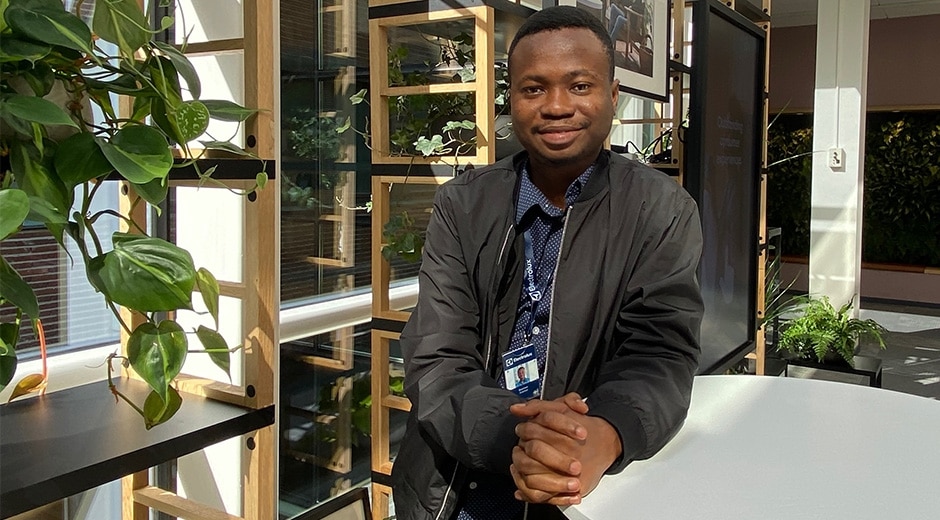Branham Anamon, our new Global Diversity and Inclusion Manager, shares his story and vision of uniting inclusion efforts across Electrolux to become a global leader in diversity.
Where did your passion for diversity and inclusion come from?
I was born in a very small village in the central region of Ghana. I lived mostly with my dad and stepmom, and we had humble homes, but moved around a lot. As a child I always felt like an outlier – someone who didn’t fit in. In most of the communities where I grew up, education was a luxury and young peoples’ dreams were easily shattered. I always knew there was something wrong, but I thought there was nothing I could do.
I remember this boy I studied with in school who was brilliant. He should have gone on to do amazing things, maybe become a doctor and save lives, but his family didn’t have money to pay for his high school education. And that one thing changed his life forever.
I think that was the moment where I began to really question – Why do some people get opportunities and others don’t?
Did you go on to study?
Yes, fortunately, I continued my studies of political science and psychology at the University of Ghana. On the first day of college I met AIESEC, the international youth-led leadership organization. They gave me a platform to speak up for myself and others. I also learned to manage multi-cultural teams, travel, oversee large-scale community development projects and along the way, I continued to discover the power opportunities can have on a life.
I spent seven years with AIESEC and during that time I also learned to confront my own stereotypes. For example, I went to Kenya in Africa, but it’s worlds apart from Ghana. Did you know most Kenyans don’t eat spicy food? I love spicy food and thought everyone who comes from Africa must love spicy food! This just goes to show that bias is always there and we need to be vigilant.
Where did you go after AIESEC?
I furthered my education at the University of Manchester, UK where I earned a Master of Science degree in International Development. Later, I joined the Global Diversity and Inclusion team at DPDHL, where I took all my academic and field experience and brought it to the corporate environment. I learned how to drive ideas and actions through an organization with many different divisions, employees and stakeholders without losing the impact in the process.
After DPDHL, I moved to the British Council where I worked with equality, diversity and inclusion and inclusive education. It was an amazing opportunity where I got to support girls’ education, which is dear to my heart. We know that education is a key part of the solution for many of the problems facing society, yet girls in particular have, in many cases, received the message for so long that they are not welcome. Our work was dedicated to changing that message and trying to find long-term solutions to ensure more girls have access to STEM education.
When we all have the opportunity to grow, we all thrive. My friend from school is still back in the village because he didn’t have the same opportunities. That is why I’m here today. To be part of the change.
Why did you choose Electrolux as your next step?
It’s an exciting time for the company. The early diversity and inclusion work, like most companies, was focused on compliance. After that comes awareness and I see a lot of energy and potential at Electrolux. This is an opportunity to share my experience, enhance my professional development and learn more about Electrolux and the people working here. It ticks all the boxes for me.
What’s next for our diversity and inclusion work at Electrolux?
The diversity and inclusion work at Electrolux is critical for us as a company. The way we create change is by clearly articulating our main drivers and objectives. It’s the key behind innovation and it helps us drive our business results in three key areas: diversity, inclusive culture and equal treatment.
The next step is taking our objectives and the work we’re doing and embedding them into all our behaviors, processes, policies and operations, so it becomes part of our DNA.
The good news is we’ve already started. There are task forces, individuals, groups and leaders all across the company working hard to position us as a global leader in diversity. The next few months and years are going to be exciting as we continue that work.
Why is diversity and inclusion so important at Electrolux?
Simply put, if we want to create an environment that drives innovation, we need to be a leader in diversity. We cannot have diversity without inclusion and equity. To compete in today’s world, or even to meet any unexpected challenge, we have to be agile and we need to move fast. We cannot do this if we all think the same way. We need people from different backgrounds and then we need a culture that supports and encourages diverse thought.
How can everyone reading this contribute to diversity and inclusion where they work?
First, you need to live up to the standards of diversity and inclusion yourself. Admit your own biases and learn from them. Use inclusive language. Have conversations with a leader or colleague who can help guide you. This is what you can do on an individual level.
Second, stand up for what’s right and be an ally. Stand up for others. We all have a group responsibility.
Third, if you’re in a position to create change, do so. Leaders have an extra responsibility to create safe spaces where people can speak up. We all deserve to feel valued and appreciated for who we are.



